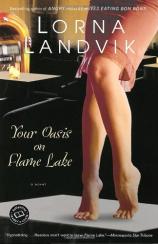Interview: June 1998
Q: Where did the idea for this story come from?
LL: I really don't know. The characters just came into my head and said, "Here we are. We want a story told about each of us!"
Q: Your first novel, Patty Jane's House of Curl, was rejected many times by publishers. Did you ever doubt yourself as those rejections piled up?
LL: I didn't mind the rejection because I knew I was involved in a process, that the book was being seen, and that rejection slips were going to be inevitable. There were times I felt discouraged, but I also figured the manuscript just hadn't landed on the right desk at the right time. The process by which a publisher chooses a manuscript can be so serendipitous. An editor who turns you down on Monday might see merit in your manuscript on Friday. Occasionally, for solace, I would page through Rotten Rejections, a book that contains copies of rejection letters sent to the authors of some of the greatest literary masterpieces ever written.
Q: You alternate among five narrators to tell your story: BiDi and Devera (friends since childhood), their husbands, Sergio and Dick, and Devera's daughter, Darcy. Darcy is not the only child in these two families, so why did you choose her to be the voice of the younger generation?
LL: I don't know. I've always let the characters lead me, and Darcy was the one who asserted herself. I tried to make Franny one of the narrators, because her story is one of the central events of the novel. She just didn't want to talk. Some readers have said they think it would have added to the story to have Franny as the narrator. Others say it lends her a certain power to not have her voice heard but to have her story told through everyone else's eyes. I feel secondary to the wants of my characters. I can't push them around. They're the ones that push me around.
Q: How do you find and latch on to those different voices?
LL: They just come to me. I never base my characters on specific individuals but rather on the stew from which all writers write--our imagination, our experiences, and the people we've met. As each chapter ended, the characters asserted themselves as to who would go next. It was a relay in which the baton passed from character to character.
Q: What are the advantages of writing with more than one narrator?
LL: You get more access to each character. Using multiple voices allows you to explore not only what the characters say but also what they think.
Q: Did you find it difficult to write in a man's voice?
LL: All I did was sit around in my underwear and boss my spouse around. Inspiration then came quickly. Actually, I enjoyed writing in the male voice. It was fun allowing these characters to be so honest and to say things people might otherwise be too polite to express. That's also why I like to write in multiple voices. It gives me the freedom to let my characters show all their rough edges.
Q: What do you like about Franny?
LL: I like her because she's so strong. I like her ability to keep a firm sense of herself while people are telling her she should change and be more like everyone else. I've always been drawn to people who follow their own path and refuse to listen to all the "traffic cops" in their lives. Franny is like that when it comes to ice hockey.
Q: Your debut novel was well received by critics and reviewers. What sort of pressure does this place on you to produce an equally successful follow-up?
LL: My first novel, which received a tremendous response from readers all over the country, was a very emotional story. I was a little worried that people would be looking for the same kind of emotional roller-coaster ride, because I knew Your Oasis on Flame Lake was going to be different. It's a more thoughtful story. While I don't want to write the same book again and again, I do want to write stories in which the characters seem real, characters in whose lives the reader can become engaged. I want my stories to have a good touch of humor, and if readers reach for a Kleenex every once in a while to wipe away tears, then I think I've done my job.
Q: Do you find your experience as a stand-up comedian coming into play in your writing
LL: I do. I've done stand-up and improv and know how important timing is in live performance. In writing, I'm very aware of the rhythm of a sentence. A wrong word can lay a rotten egg on the page as surely as a bad joke can lay an egg on the stage. The right word, on the other hand, makes the joke.
Q: You wrote the screenplay for your first novel, which was optioned for a movie. Do you prefer writing novels or screenplays?
LL: Writing a novel is much more fun than writing a screenplay. A novel allows you to take a long trip with your characters--going down as many side streets as you want. Screenplay writing follows a more precise format. You always have to think, "How will this look on the screen?" The enforced focus on visuals takes you away from your character's thoughts.
Q: Why does Franny decide to stop playing hockey? Will she eventually play again?
LL: Franny was never a hotdog kind of player. She loved to play just for the sheer joy of the sport. But being the only girl on the team made her a target. After she was attacked, she wanted to remove herself from the situation that had given her so much pain. I really don't know what she'll end up doing, but my personal opinion is that in a year or two, Franny will get back on the ice. I think she'll eventually realize she can't let the attack lock her away from something she really loves to do, but for now she needs to take a break.
Q: What advice do you offer for beginning writers?
LL: Write every day. Once you've written something and decide you want to get it published, never give up! Don't ever let someone else's "no" stop you from doing what you want to do. Beginning writers also need to know what moves them as a reader. If they can get a handle on that, it will help their own writing. And they need to closely consider their characters. A writer always has to ask, "Are my characters strong enough? Do they seem real to me?" If they seem real to the writer, chances are they'll be real to the reader. One final word of advice: eavesdrop as much as possible. Listen to the way people talk. Don't try to make great art out of dialogue. Just make it sound real.
Q: Has the success of your books changed your life at all?
LL: It hasn't changed it in any grand way. I'm still writing at my kitchen counter. Of course, it's enormously rewarding and validating to have your work published and to have people like it. I love being able to say, "I'm a writer," without having people roll their eyes and ask me how I really make my living. Although if I hadn't been published, I'd still be writing . . . and working temp jobs.
Q: Describe the evolution of this story.
LL: When I lived in Los Angeles I wrote a lot of performance comedy, stage shows, and sitcom scripts that were never produced. To keep my hand in the world of fiction writing, I wrote short stories. Unfortunately, my short stories were never really that good. Your Oasis on Flame Lake was one such effort. I sent it to an editor, who wrote a letter back saying he found the writing spectacular but couldn't make heads or tails of the story. I put it back in the drawer, but the characters kept yammering at me to get them out. They wanted a fuller accounting of their lives. When I realized what they wanted, and where they wanted me to go, I was able to transform the short story into its current incarnation.
Q: Are you planning a sequel to either of your first two books?
LL: I don't know. I've fielded a lot of questions about sequels to both novels, and there are some ideas percolating inside me about revisiting the House of Curl. I'm very curious to find out what's happened to Patty Jane and the crew. So far, however, I'm directed by the characters in the book I'm currently working on.
Q: Is writing easy or hard for you?
LL: I classify writing as "fun"--rather than "easy" or "hard"--and enjoy it tremendously. I'm not the greatest disciplinarian, however; I like to take long lunch breaks, longs coffee breaks--long breaks in general!
Q: Are there any parallels between your own household and the households of BiDi and Devera?
LL: Well, I do have a big-hearted husband. I also have hockey-playing daughters, but they hadn't started playing when I wrote the book.
Q: Why doesn't Franny name her attackers
LL: Because she didn't want to get that weasel, Pete Arsgaard, in trouble. In many ways, Franny is incredibly strong but was weak in that she wanted to preserve her relationship with this guy, no matter how small it was. I was actually very troubled that Franny tried to protect him. If it had been Darcy who was attacked, she would have come forward right away.
Q: What do you mean when you say you were troubled by Franny's failure to come forward? Aren't you the one controlling her actions?
LL: The old writer's cliché--that the characters take on a life of their own--applies in this case. Writers, to me, are like airplane pilots. Although they guide the plane to its final destination, they don't necessarily control what each of the passengers is doing. It's a joy when your characters become so real that you can't control them. They're like real people, with all the complexities, doubts, quirks, and desires. It's great fun to try to figure them out and see why they're doing what they're doing.
Excerpted from Your Oasis on Flame Lake © Copyright 2012 by Lorna Landvik. Reprinted with permission by Ballantine Books. All rights reserved.








